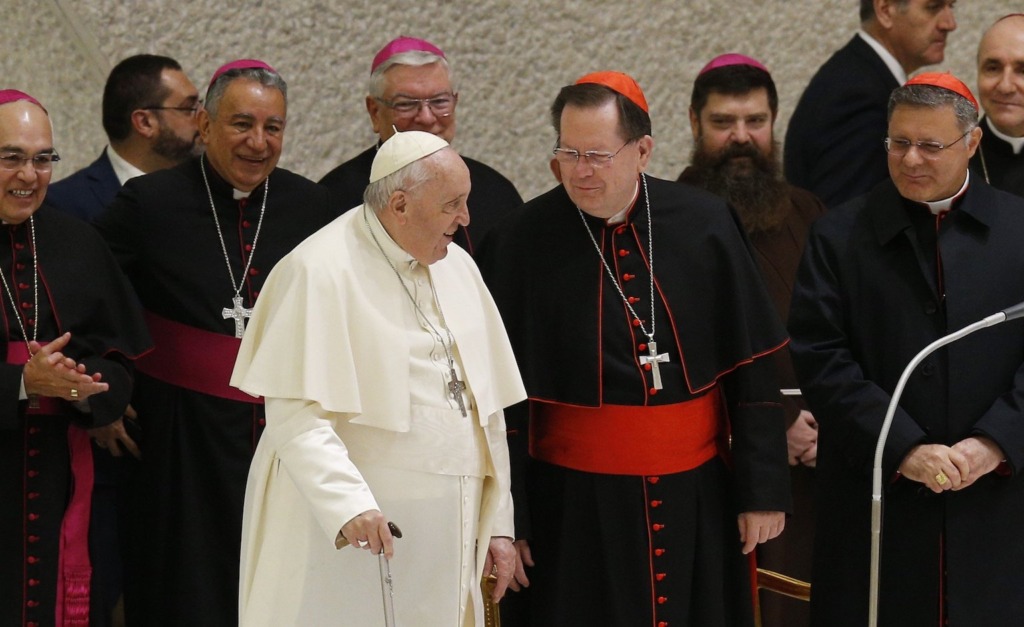VATICAN CITY – Christians should not seek the Lord by themselves without being part of a faith community and without spiritual accompaniment, Pope Francis said.
However, Pope Francis cautioned against forms of accompaniment that “can give rise to unrealistic expectations, misunderstandings, forms of dependence that leave the person in an infantile state.”
The person who accompanies others in their spiritual life “does not substitute the Lord, does not do the work in the place of the person accompanied, but walks alongside him or her, encouraging them to interpret what is stirring in their heart,” the pope said Jan. 4 at his weekly general audience.
Speaking with visitors in the Paul VI audience hall, the pope concluded his series of talks about the process of spiritual discernment by focusing on the importance of spiritual accompaniment in helping and supporting this process.
Spiritual accompaniment is “important first and foremost for self-knowledge, which as we have seen is an indispensable condition for discernment,” Pope Francis said.
“God’s grace in us always works on our nature,” the pope said, which is why “it is important to make ourselves known, without fear of sharing the most fragile aspects: where we find ourselves to be more sensitive, weak or afraid of being judged” with a person “who accompanies us on life’s journey.”
“Fragility is, in reality, our true richness,” he said, and it must be respected and welcomed. “Indeed God, to make us like him, wished to share our fragility to the utmost” as can be seen with his birth in poverty in a manger and his death on a cross.
People who do not think they are fragile are “trouble,” the pope said, “They are harsh, dictatorial.”
Instead, when a person humbly recognizes his or her vulnerability and weaknesses, he or she tends to be more understanding toward others.
“Recounting what we have lived or are searching for in front of another person helps bring us clarity, bringing to light the many thoughts that dwell within us, and which often unsettle us,” he said.
“False and poisonous thoughts,” such as “I have done everything wrong, I am worthless, no one understands me, I will never succeed, I am destined for failure,” he said, can be “unmasked,” understood and overcome better with the help of another person.
“We discover with surprise different ways of seeing things, signs of goodness that have always been present in us,” he said, “so we can feel we are loved and valued by the Lord for what we are, capable of doing good things for him.”
Spiritual accompaniment is about helping a person “better understand the signs of the times, the voice of the Lord, the voice of the tempter, the voice of difficulties that I am not able to overcome, and this is why it is very important to not journey alone,” he said.
Like looking in a mirror, he said, discernment without accompaniment can result in just seeing what one wants to see, while “looking at oneself with another’s help helps a lot because the other person, when they are sincere, tells us the truth.”
Also, he said, “we discover we are children of God at the moment that we discover we are brothers and sisters, children of the same Father. This is why it is essential to be part of a journeying community.”
“One does not go by oneself to the Lord,” he said. “This will not do. We have to really understand this.”
Pope Francis ended his talk by saying, “discernment is a gift from God, which must always be asked for, without ever presuming to be expert and self-sufficient.”
The faithful need to pray to God for the grace of discernment, “what I have to do, what I have to understand,” and for the gift of someone who can help with discernment.
“The voice of the Lord always can be recognized,” he said, because “it is a voice that pacifies, encourages and reassures in difficulties.”
The Lord tells his people, “Do not be afraid,” because if they trust in his word, they will live life well and be able to help others, he said. God’s Word “is a lamp to our feet and a light to our path.”

